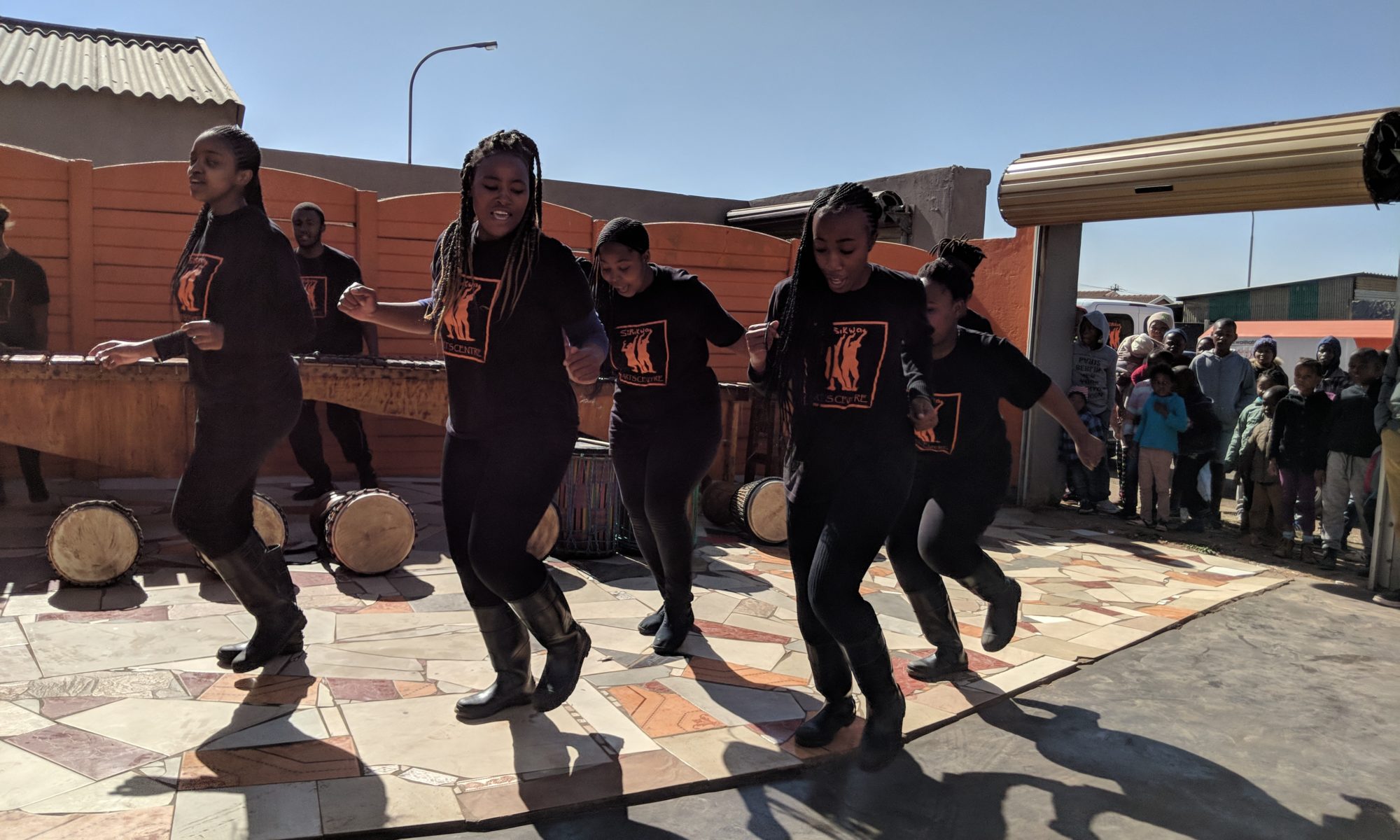Reflections on South Africa from staff at the Albany

Nadia Niesterowicz-Newstead, the Albany’s Marketing and Communications Manager, travelled with Linda Bloomfield, the Albany’s Creative Programme Manager to South Africa in July 2018. The trip was focused on one of their Creative Dialogues lines of inquiry: Investigating how neighbourhood cultural centres can play a significant role in the development of their local communities, with artists at the centre of the process. Here’s what they had to say about their visit:
Contemporary performance bubbles under South Africa’s surface. As a regular tourist, you would see lots of traditional dance and song, which the government and arts council are very happy to support, but gaining funding for the contemporary or social participatory arts is another matter. Funding streams are corrupted and no money is ever guaranteed, even if awarded, making it very difficult to share work to wider audiences outside of South Africa, even the African continent, let alone Europe or beyond. The work that does get through the barriers is down to the incredible hard work of the individuals who do not give up on the talent and understand the importance of sharing their stories around the world.
On our trip in July 2018, my colleague Linda and I met with several very exciting organisations and artists as well as with the British Council to talk about the possibilities of making connections with Southern Africa in order to share the performance and community work being done there with a wider audience.
We were particularly moved by the work being done by Sibikwa, an arts centre for young people in the district of Benoni, Johannesburg. Run by Smal Ndaba and Phyllis Klotz, the centre has been running for over 30 years and works particularly with young people who are out of education or work, of which there are many in this deprived area. Many people speak of the arts having life changing effects but we heard it direct from the young people who use the centre. ‘This place has changed my life’ said a young woman who is currently directing the music for one of their productions. The Sibikwa philosophy is to broaden the horizons of the young people it works with so that they are professional, responsible people with transferrable skills who can, if they wish, forge a career in the arts. If you’re only interested in theatre you will be encouraged to learn all the disciplines on offer, thus not only are the young people challenged but also will inevitably be able to spend more time at the centre and less time on the streets. The talent nurtured and developed at Sibikwa is phenomenal and the generosity of Phyllis, Small and their team is never ending. They are there seven days a week and are constantly working to extend their reach to new people in need of their support. Their latest project is going out to communities outside Johannesburg such as KZN and training them in theatre, music and dance in order that they can share their knowledge and skills with their own communities, making them producers of creative events in their home towns.
Attending the first Pan African Creative Exchange (PACE) in Bloemfontein, we were able to see in a relatively short period of time, the main themes that are emerging in South African work, as well as across the continent. A relatively young democracy, much of the work being made is very serious and speaks of politics and the atrocities of the past including race relations, murder, rape and the HIV/Aids epidemic; what happened and how it still affects society today, generations later, as well as what is needed for the future. A lot of this work is being made by the younger generations, keen to tell the world that they are unhappy with the status quo and want to move things forward.
When speaking about their performance art piece In These Streets, artist Wezile Mgibe said ‘Africa is a crime scene’, a statement that particularly stuck with me throughout the rest of the trip and beyond. A second piece that to me really demonstrated the future of the work being created in South Africa was Hani: The Legacy, a piece created by young people from The Market Theatre Lab, based in Johannesburg. A serious story of the life of Chris Hani, a major figure in the ANC, who was shot after the end of apartheid, the piece was told with hip hop, dance, energy and entertainment, a breakaway from the some of the other pieces which dealt with similar issues but were told in much more aggressive styles.
There is much to be said around what PACE means for the African continent. Several artists were unable to attend their presentations due to visa issues and only seven out of 54 African nations were represented as part of the programme. A discussion around Gatekeepers became quite heated around whether it should be up to organisations to hold the gates open, or whether it should be up to artists to bash the gates down and how do you maintain the quality of work that is presented if you hold the gates open. This definitely resonated with similar discussions I’ve heard in the UK and is far from resolved on either side.
Time and again in our conversations with venues, organisations and artists, the main points were around funding, ongoing race relations and corruption. There is definitely very good work being made in South Africa but it may well continue to bubble under the surface if these three major pillars cannot be toppled in the future.
Organisations we connected with:
Sibikwa Arts Centre, Benoni, Johannesburg
British Council South Africa, Johannesburg
African Writers Trust, Uganda/London (PACE)
The Market Theatre Lab, Johannesburg (PACE)
Assitej South Africa, Vryground, Muizenberg, Cape Town
Alexander Bar and Theatre, Cape Town
Nadia Niesterowicz-Newstead & Linda Bloomfield
@TheAlbanySE8